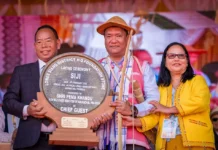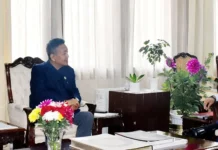[Suresh Mohanty]
The Manipur ethnic mayhem which commenced consequent to the ‘Tribal Solidarity March’ on 3 May, 2023, continues unabated. The trigger to the current unrest fundamentally lies in the Imphal High Court directing the government to recommend granting of ST status to the majority Meitei community, a demand for nearly a decade, thus endangering (or a being a threat to) the reservations in government jobs, control over land, and other preferential treatment being thus far enjoyed by the hill tribes, including the Kuki-Zomi and the Nagas. There are other pressure points to include destruction of poppy cultivation and eviction of hill population from encroachment into Khoupum protected forests (38 villages). The Meitei community comprising of 53 percent of the population settled in the Imphal valley dominate the political and bureaucratic landscape of Manipur. The developmental disparities between the hill districts and the valley floor in terms of educational institutes, health facilities, infrastructure and transportation is not merely a manifestation of greater political and bureaucratic heft of the valley-based community but also restrictions on enterprising businessmen from investing in the hill districts. The current chief minister did reach out to the hill districts in his previous tenure, but the ring-fenced hill vs valley-based community mindset has been difficult to bridge. Consequent to the visit of the union home minister, a number of initiatives to include commission of enquiry by a retired high court judge, payment of compensation to those killed and injured in the violence and constitution of a peace committee to broker peace amongst the communities have been initiated. However, the tribal dynamics and complicated social fissures are too convoluted to be resolved from outside the community. While the political leadership must ensure a conducive climate, the eventual peacemakingefforts must emerge from the communities themselves.
There are nearly 25 Kuki insurgent groups in suspension of pperations (SoS) with the government since 2008 for a Kukiland Territorial Council. These groups have weapons, ammunitions and other stores housed in 13 (SoO) designated camps which the security forces have limited access to either monitor or control; and the Meitis allege has led to expanding population due to illegal migration, extortion, poppy cultivation, gun running and drug trafficking. The Nagas have their own designated camps (taken note of) spread across Nagaland and Manipur under the ceasefire agreement in 1997. It may be recalled that in the 1990s the clash between Nagas and Kukis resulted in loss of hundreds of lives on both sides. The Meiteis on the other hand also have their own insurgent groups, including the UNLF, PLA, PREPAK and KYKL, which operate in the valley with impunity, especially after the Imphal valley was declared as a denotified zone, with the Assam Rifles vacating the Kangla Fort, consequent to the Manorama incident. These groups have camps in Myanmar and Bangladesh. The PLA is one such group which has claimed to have been involved in the ambush of Col Viplab Tripathi and his family in 21 Novembere. While the valley-based Meiteis stay in 10 percent of the land area, over the last four decades, large hill population has also migrated to the valley due to better educational, health and other economic avenues, and thus the competition for the same land has intensified. The converse is not true since hill-based tribes enjoy ST status and land rights over the hill areas. Meiteis consider this as a threat to their culture, language and identity. The ethnic tribal dynamics is not peculiar to the state of Manipur alone. Similar demand for reservation has galvanised polarisation amongst communities in other parts of India, owing to growing aspirations for economic uplift against shrinking job avenues. Reservations were meant to rectify past historical injustices against backward classes, ensure equal representation and provide an equal platform to everyonem, irrespective of castes, and for greater inclusiveness in the Indian society, which has continued despite 75 years of independence. The demand for reservation has only continued to grow turning out to be divisive over religion, caste, denomination and ethnicity. The Supreme Court recently ordered 10 percent reservation for economically weaker sections, which is beyond the ceiling of 50 percent and excluded the creamy layer. This has eventually resulted in better skills departing Indian shores for better pastures outside. Those upwardly mobile and economically prosperous amongst the reserved categories do not want to give up their share despite generations of enjoyment of fruits of reservation.
Today, there is an acute trust deficit and mutual suspicion between the Meitei community and the Kuki-Zomi community, both of which are demanding government intervention to bring about peace instead of reaching out to each other to calm tempers. Meitei and Kuki communities in Delhi protest to demand central intervention while Nagas demand that in any creations of autonomous regions for Kukis should not include Naga majority areas. Attempt to give it a rhetoric religious dimension ie Hindu vs Christian will only make it a deadly cocktail.
The central government and the peace panel only have limited leverage amongst local communities to bring about peace unless the two communities internalise the deep fault lines in the spirit of accommodation and inclusiveness and reach out to each other for the betterment of future generations they need to nurture and protect. The 10 Kuki MLAs and the majority Meitei who demand termination of the SoO will have to play a major role in peace making. Soldiers of both communities live in perfect harmony in the armed forces and the CPMF, which can extend into the civil society. In a larger canvas of inclusiveness, continued reservation extending into even in promotions is likely to trigger bigger similar conflict amongst other communities. It should not remain a political expediency to win elections. For the time being, inter-tribal/ethnic amity is the sine qua non to end the continuing violence in Manipur. (The writer is security adviser to GoAP.)



